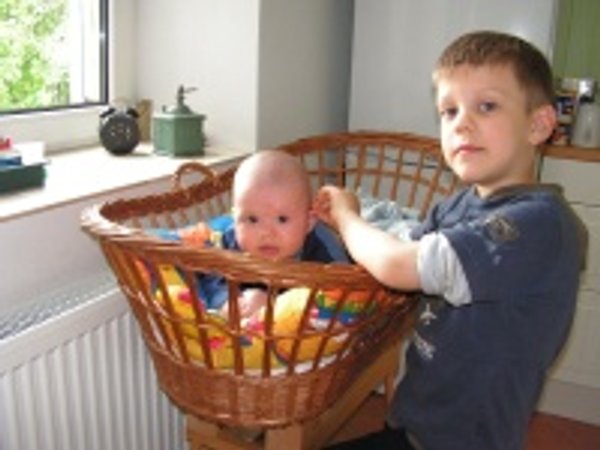Nobody wants these things to happen, but they do happen. During his summer vacation, “Antek the Knight” had a stomachache and did not feel like playing with his sisters Marysia and Rosa. He lay in bed crying.
His parents took him to the emergency room where they gave him an injection to relieve the pain. “He did not like that at all,” his mother, Dorota, explains, “but it did relieve the pain in his stomach. We thought it was just a one-time thing, but then we kept returning to the hospital more and more often.”
After the summer vacation ended, Antek started school. With his joy and his gentlemanly conduct he soon won over all his teachers and schoolmates. He always liked to play at being a knight errant, and he behaved accordingly.
Antek's family lives in Warsaw where the children attend a school that is a corporate apostolate of Opus Dei.
In his family and in his school—Sternik, a corporate apostolate of Opus Dei—people prayed for Antek’s health. Something was not right. Antek, however, was praying for many other things, more or less serious, like peace in the world, his sisters, his favorite soccer team. . .
Finally the doctors decided to operate for appendicitis. But, far from being the solution, it was only the beginning of even stronger stomachaches.
“Why do I have to be in the hospital,” Antek asked. “Why am I sick?”
His mother had little she could tell him, and she tried to explain it in the following way: “My son, if Jesus looked at you and asked you, ‘Antek can you help me with my cross?’ what would you say to him?”
“Well, I guess I would say yes.”
“Well, that is what he is asking you now.”
A friend of Antek’s parents, a priest, went to visit the boy. He spoke with him and gave him a small wooden crucufix. From then on, Antek kept the cross in his hand when he went for tests or when he was taken into the operating room.

The nurses saw that the boy would put his hand to his mouth and heard him whisper, “Jesus, I trust in you.”
On the day when the doctors were going to make their definitive diagnosis, Dorota tells how she walked slowly toward the doctor’s office, like a women nine months pregnant. “It is cancer,” the doctors told the parents. “Tomorrow we will begin chemotherapy.”
Antek the Knight faced this dreaded dragon with courage but little strength. With no hair, vomiting, and weak, he asked, “Mommy, what is happening to me?”
His mother told him the truth. “You have a sickness called cancer. The doctors will try to cure you, but you have to know that they are not always successful.”
“You mean that I could die?”
“Well. . . like all of us, like Daddy, like me.
But only God knows in what order.”
The boy did not say anything more. He just turned, took his crucifix from the table and whispered again, “Jesus, I trust in you.”

His mother set up a chain of prayer in their family and among their friends. Every day she received text messages in her cell phone: “Today I went to Mass for Antek”; “I will do a few minutes of prayer for your son.” Dorota asked for prayers from anyone she could. One day, as she was getting out of a taxi, she said to the driver, “My son is dying. Would you be able to pray for him?”
She prayed and had others pray. She wanted to present God “with tons of prayers.”
Antek struggled hard against the cancer. Some days he was strong and would run all around the hospital like lightening, making a big commotion. Other days he hardly had enough strength to watch television.
He matured rapidly. More and more frequently he would ask his mother about death, heaven, and the reason for suffering. “Mommy, what do you do in heaven?”
Dorota asked for prayers from anyone she could. One day, as she was getting out of a taxi, she said to the driver, “My son is dying. Would you be able to pray for him?”
“You play, you ride your bicycle, you enjoy yourself with God.”
His mother now believes that those “tons of prayers” gave Antek a rest before the end. For some days he felt perfectly fine. He ran from here to there, he went for walks, he had recovered his happiness.
But the doctors knew that his cancer was continuing to grow ever more rapidly. They advised his parents to take him home where he would be more peaceful during his last days. There he fell sick once again. Still, Antek enjoyed being home with his family. From his bed he could see his mother preparing dinner, his sisters doing their chores, his father reading him a story.
One day he called to his side his sister Rosa, with whom he sometimes quarreled. “Rosa,” he said, “you are so sweet and so good. I love you. Remember that.”
On another occasion his father, with tears, said to him, “My son, if I could, I would die for you.”
The boy smiled with difficulty and responded, “But I am the one who is going to die for you.”
Antek died a little after seven o’clock in the morning. He was six years and nine months old.
On his grave a friend wrote, “Thank you Antek. You taught us to accept the suffering that comes without our knowing why. To support ourselves with our faith. To accept the will of God and to trust in Him.”
